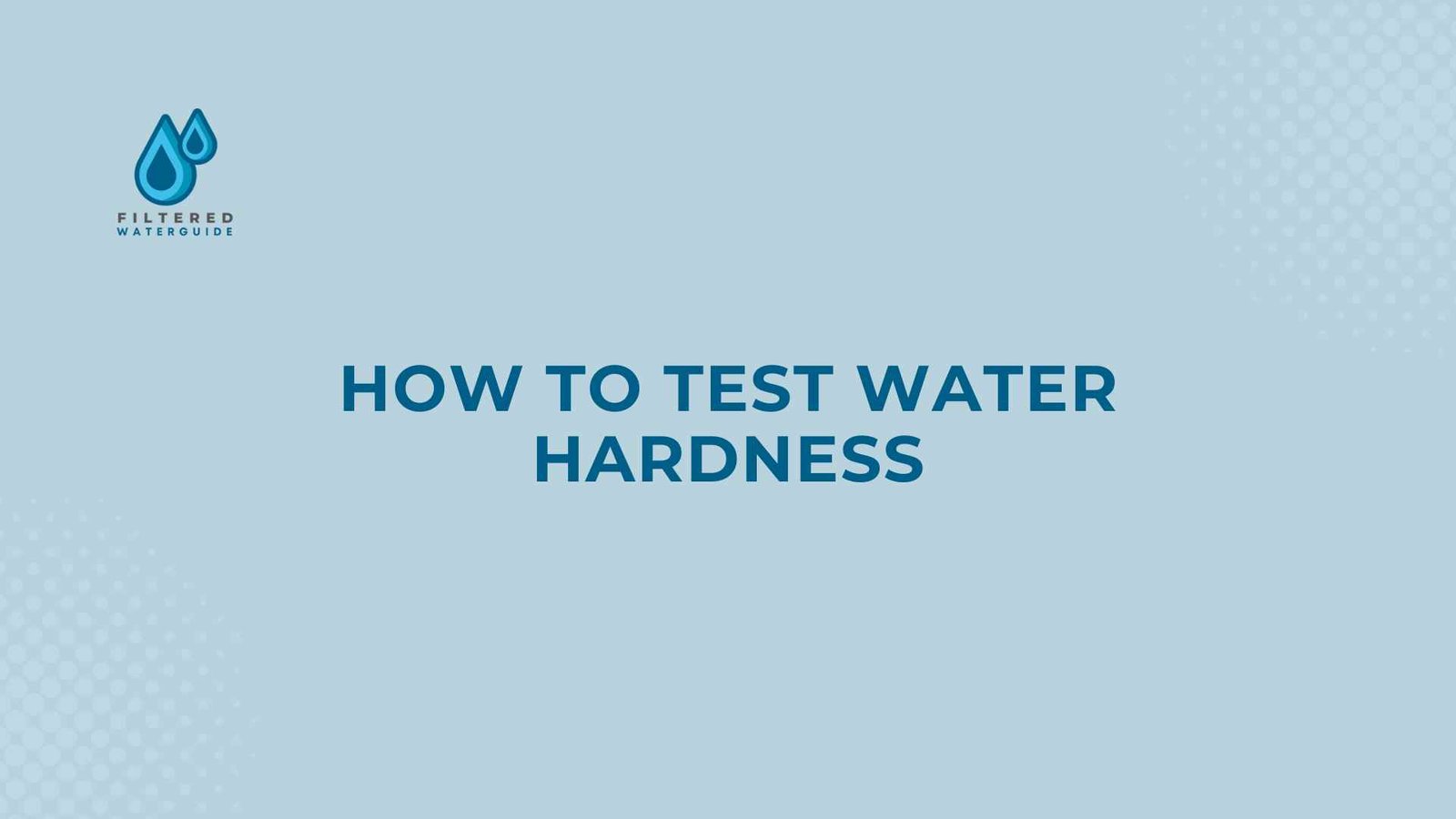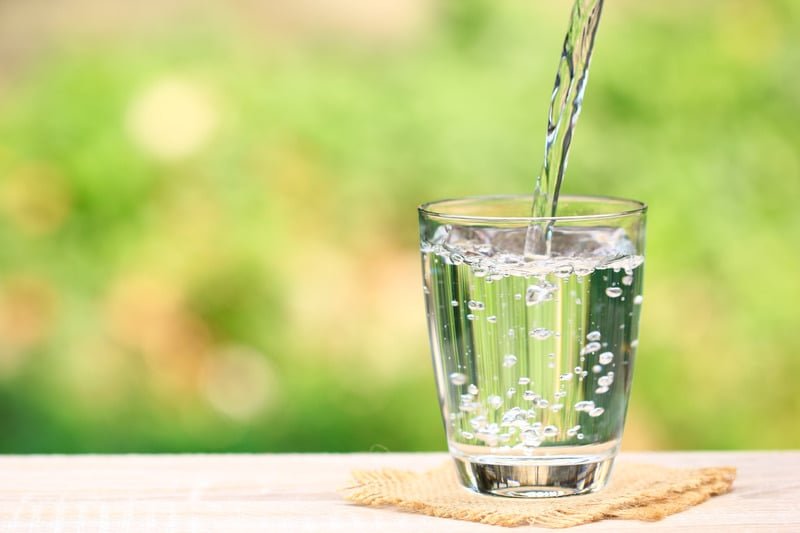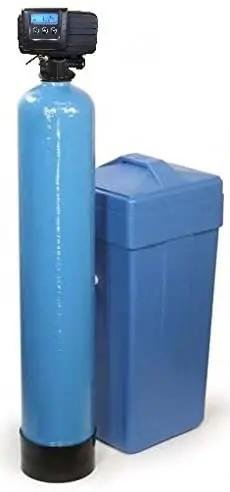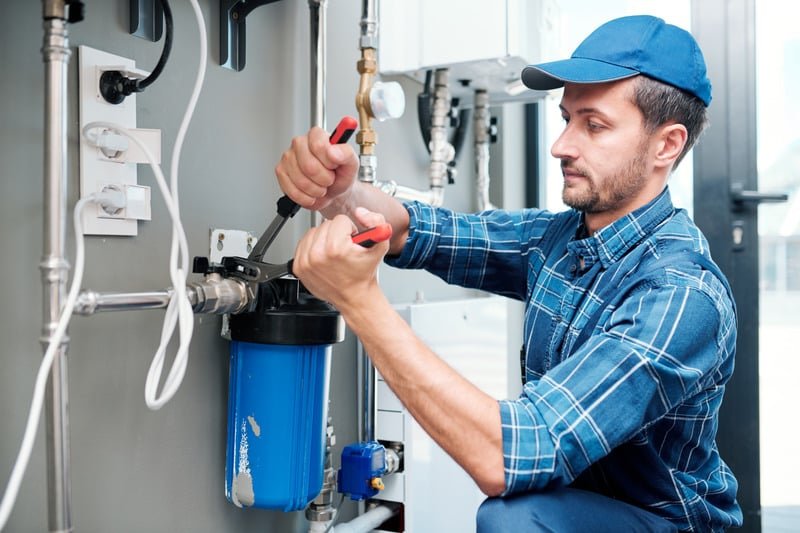Filteredwaterguide.com is supported by readers. If you purchase through referral links on our site, we make a commission at no extra cost to you. Learn more.
If you suspect that you have a hard water problem in your home, you need to verify that so you can get it corrected. That’s why knowing how to test water hardness is so important.
Once you know for sure that you have a hard water problem, you can then better decide how to treat it.
As a 26-year veteran in the swimming pool industry, I have experienced many of the problems hard water can create and learned how to take effective steps to lessen them. I can assure you that lowering the impact that hard water has on your household is not very complicated.
In this article, I will discuss the various ways that you can definitively determine that you have hard water, how to get an accurate water hardness score by testing, and how to resolve this issue once that you know for sure that you have hard water.

If you have incoming water in your home that’s considered to be soft, you are definitely in the minority. That’s because a good many homes have water that’s determined to be ‘hard’ even after it has passed through a municipal water facility.
Well water is even more susceptible to being deemed hard water. That’s because groundwater easily picks up calcium and magnesium compounds that cause hard water. It does this as it percolates through limestone, chalk, and gypsum deposits while it makes its way further underground.
Here are a few ways that you can confirm that your water is considered to be hard.

If you are on municipal water your water company will keep records each time they test your area’s drinking water. They can usually provide you with a copy or they may post it on their website where you can get electronic access to it.
Water hardness is a standard test that they should take every time they test their treated water. If you have questions about the test report, someone at the facility would probably be willing to discuss those results with you.
You may not believe it but one of the easiest ways to determine if you have hard water is to do a simple soap test. It’s a fairly reliable way if done right to determine you have a hard water problem.
This test works because when you have hard water, it tends not to produce much lather when you are using soap or shampoo in the shower.
Here is how it’s done:
Soft water will readily form bubbles on top of the water and the water below the bubbly layer will appear clear.
Fortunately, identifying that you do indeed have a hard water problem is something that you can easily do yourself at home. Test kits are readily available for this purpose and they are not that expensive.
These hard water test kits usually come in packages that include either test strips that you dip in or drops that you add to a water sample. Both identify the presence of hard water by changing colors and then comparing that color to an included chart.
This included chart will indicate the extent of your hard water problem.
Using test strips offers the most convenient way to measure the amount of total hardness in your incoming tap water. All you have to do is quickly dip them in a sample of your tap water and then you will have a result in less than 2 minutes in most cases.
An example of a hard water test kit that uses test strips that I like is the ‘SJ Wave Water Total Hardness Test Strips’.
I like this test kit because it detects hard water in a range of 0 – 425 ppm and comes with 150 strips. This is more than you will probably use during this product’s shelf life.
It’s also a very inexpensive hard water test kit and can be used to test for water hardness in your swimming pool and aquarium too.
These work a little differently than test strips but will give you a more accurate result as to the extent of your tap water’s hardness. They work by placing a few drops of indicator in a pre-measured container and then comparing the color the water turns to the included chart.
When cross-referenced on the chart, this will give you a number. Drop-based water hardness test kits usually have more than one test they require to produce a total hardness figure. These figures are combined to produce a very accurate total hardness score.
The biggest drawback with drop-based hard water test kits is they are more difficult to use. They also can be as much as 3 times more expensive than hard water kits that use test strips.
Among the drop-based water hardness test kits that I like the most is the ‘Hach 145300 Total Hardness Test Kit, Model 5-B’.
This drop-based test kit measures both carbonate hardness and non-carbonate hardness (carbonates and non-carbonates are made up of hard water causing calcium and magnesium), when compared to the included chart this gives you a score. These scores are then combined to give you the total hardness score of your tap water.
As was mentioned, this will give you the most accurate total hardness measurement of your incoming tap water that you can get from testing your tap water yourself at home.
Hard water is best treated in one of two ways. This is through the use of water softeners or whole house filtration systems.
If you are on municipal water your water company will keep records each time they test your area’s drinking water. They can usually provide you with a copy or they may post it on their website where you can get electronic access to it.
Water hardness is a standard test that they should take every time they test their treated water. If you have questions about the test report, someone at the facility would probably be willing to discuss those results with you.
Let’s start by getting one thing out of the way. Some people are under the impression that a water softener is a form of water filtration device. That’s not true at all. It’s a form of Ion exchange system.
Here are the two main types of water softeners.

Salt placed in solution in a bed of resin beads is the catalyst that makes the ion exchange in this type of water softener take place. To put it in a nutshell, this type of water softener works by taking positively charged calcium and magnesium ions and passing them through the resin bed where a chemical reaction takes place with the saltwater brine mix. This gets these hard water causing minerals to drop out of the solution.
In other words, it takes away their ability to stick on bathroom surfaces, fixtures, pipes, and cause other hard water problems.
The biggest problem that comes from salt-based water softening is that some people may be sensitive to the extra salt that is added to the water during this process. Others do not like the aftertaste that is sometimes associated with drinking water that has passed through a salt-based water softener.
These are the more recently developed water softener type. They do not work like their close cousins the salt-based water softener.It would not even be wrong to classify them as a scale-inhibitor instead of a more traditional type of water softener.
In this type of water softener, calcium and magnesium compounds are chemically altered but not completely changed as they are in a salt-based water softening system. The tap water is just conditioned as opposed to removing all problem causing hard water minerals.
They do, however, nicely counter the above-mentioned drawbacks that come with using salt-based water softeners. This is because they do a good job of preventing scale buildup and some other hard water-related conditions.
Salt-free water softeners also require less upkeep than their salt-based counterparts. That’s because there are no by-products that need to be cleaned out during a regeneration cycle.
They also are virtually maintenance-free as no salt or other additive needs to be periodically added to them.
Both of these types of water softening systems are very effective at lessening the impact that hard water has on a household.
Each of them is also a relatively low maintenance water treatment system whose biggest expense is their initial cost.
I will start by saying that not every whole house water filtration system can fulfill a dual role as a water softener. That’s because it has to be one that actually has a water softening component built into it.
Others may have filters that can remove small enough particles to eliminate trace amounts of calcium and magnesium in your tap water but that won’t get you the same results as softening your water.
Many of these systems, such as the one shown above, are multi-stage systems that will include an ion-exchange component in them that works the same as a stand-alone salt-free water softener.
You can also expect a multi-stage filtration system that can soften water to be a more expensive one.
That’s not a bad thing when you consider how many other harmful contaminants in water that it most likely will be able to remove or reduce. That’s the major advantage of using a whole house water filtration system as opposed to just a water softener.
These water filtration systems are known to reduce or eliminate such potentially harmful tap water contaminants as chlorine, benzene, bacteria, protozoa, viruses, class I particulates, sediment, and many more.
To err on the safe side and to make sure that you satisfy both your hard water and tap water purification needs, I recommend that you consider installing a multistage whole-house water filter or have another type of whole-house water filter that is working in conjunction with a separate water softening system.

On average, testing for hard water is simple and inexpensive. There really is no need to put it off if you want to determine the score of the hardness in your home’s tap water.
Once you verify the extent of your hard water issue, then be proactive and do something about it. Having hard water in this day and age is something that you nor anyone else should ever have to tolerate.
There are just too many good ways to effectively lessen or eliminate hard water concerns. Many can be done affordably. Especially when considering all of the money-saving benefits you get from eliminating hard water and the cleaning headaches that you will avoid by softening your home’s water.
© 2024 Filtered Water Guide. All rights reserved.